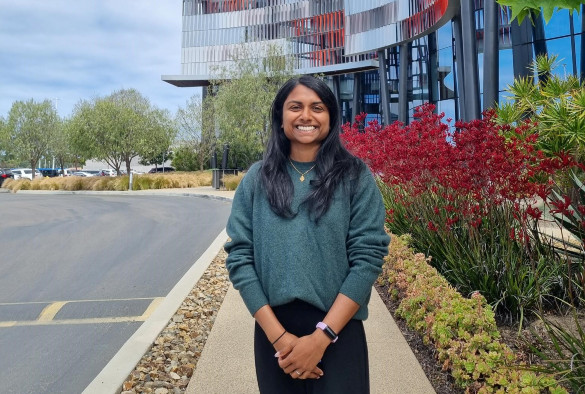Becoming an Expert: Forming collaborations between academia and industry
Published on

Dr Mira Swaminathan is a PhD student in the Department of Pharmacology and Therapeutics, funded by the Medical Research Council (MRC) and Eli Lilly and Company as part of the North West MRC Clinical Pharmacology Fellowship. She is also a Specialist Registrar in Gastroenterology training in the Mersey region.
Collaborating with industry- a unique opportunity
I’m in the third year of my PhD working in the Pharmacology department supervised by Professor Mark Pritchard. My research centres around the gastrointestinal adverse events caused by drugs, namely immune checkpoint-inhibitors. Immune checkpoint inhibitors are novel anti-cancer agents that have in the last 10 years transformed the way cancer is treated. They however cause unique side effects that mimic various autoimmune diseases and can affect any organ system.
Gastrointestinal side effects in the form of inflammation of the bowel (colitis) is a frequently occurring complication which leads to discontinuation of therapy for many patients. My research seeks to understand the underlying mechanisms of immune checkpoint inhibitor colitis (ICI-colitis) as well as discover any potential biomarkers that can aid clinicians to manage the disease better and improve overall patient outcomes.
As part of my PhD, I was lucky enough this year to go on secondment for a month to San Diego visiting my industry partner Eli Lilly. Over the last year we have been working on designing a study investigating the role of microRNAs in ICI-colitis. MicroRNAs are non-coding RNAs that are thought to play an integral role in various disease states. Several studies have investigated the altered expression of miRNAs in gastrointestinal diseases such as inflammatory bowel disease and their important role as regulators and possible diagnostic biomarkers. The aim of our study was to identify potential mediators of ICI-colitis via miRNA profiling in patients being treated with immunotherapy.
The study involved the use of patient samples that were collected in the UK and transferred to the Eli Lilly site in San Diego for analysis. Once there, I was given the opportunity to learn about the experimental techniques involved. I was also able to network with various members of team in Eli Lilly ranging from biologists and scientists to the Vice President of the Immunology. This gave me great insight into their various roles within the company and how as academics we can contribute to the research being done in industry and vice versa. We also discussed various potentially projects for the future.
Our project was also completed in the three weeks and was a success in terms of generating data. Together with my partners at Eli Lilly, I will be analysing this data and I hope to be able to present the findings in the near future. This project was not only beneficial to me but also to Eli Lilly as it enabled them to explore into a new experimental technique to gain insights into disease mechanisms.
Future plans
As I’m coming to the end of my PhD, I hope to complete my experimental work and data analysis in order to start writing up. I will be going back into clinical practice after completing my PhD but I do hope to continue making research an integral part of my career. I also hope to maintain the collaborations formed with my industry partner, Eli Lilly to work on some projects that will be of interest to both of us.
Outside of the lab
I enjoy keeping an active lifestyle mainly involving going on walks or hikes with my dog, Joni. We recently got into mantrailing which is a sport training dogs to find people by following their unique scent trail. It’s a great way to keep active and encourages us to be outdoors more.